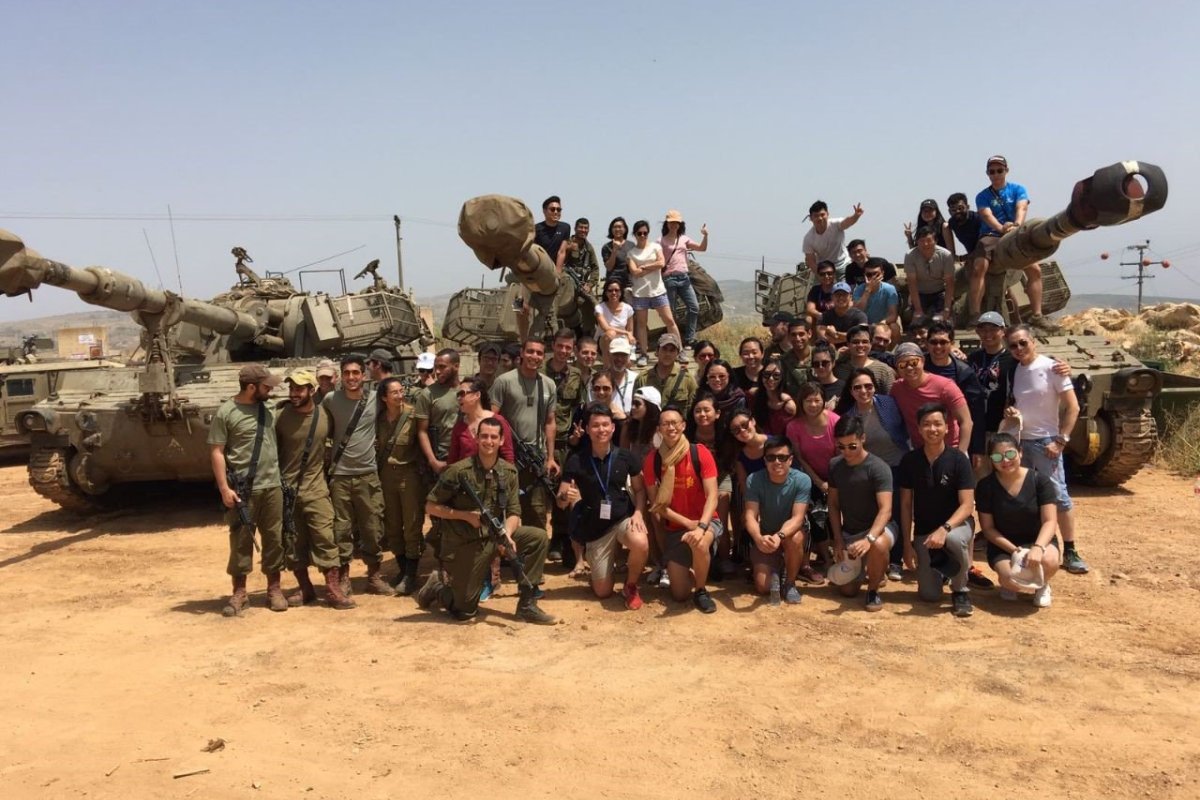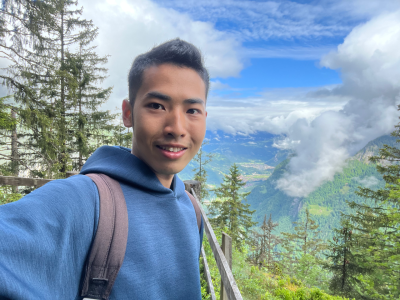
“Masada shall not fall again.”
The swearing-in ceremony of the Israeli Armoured Corps soldiers ends with this declaration at the top of Masada. Israeli soldiers ascend to the summit via the Snake Path to attend this ceremony that marks the completion of their basic military training. This ancient fortress serves as a remembrance of one of the most heart-wrenching but heroic episodes of Jewish history—the siege of Masada. In 72 CE, as the Romans laid siege to Masada, the Jewish defenders killed their wives and children before casting lots to kill each other. They had chosen death over Roman enslavement. To Israel, Masada stands as a symbol of Jewish heroism—it is better to die than relinquish national independence.
Although the siege of Masada happened nearly 1,950 years ago, we can still experience the courage and national pride of the Jews today. The Jewish state is one of the most fascinating countries in the world, and its economic success story has been studied countless times over.
The Startup Nation
We arrived in this special “Startup Nation” in an attempt to understand how a community of immigrants managed to transform a land that Mark Twain described as a “desolate country…a silent, mournful expanse” into one of the most dynamic entrepreneurial ecosystems in the world.
Today, Israel enjoys one of the highest density of startups and venture capital investments globally.
Through our study mission, we wanted to glean a deeper insight into the driving forces behind Israel’s success. Our endeavour was aided by our amazing guide—Steve Gray, the former Director and Strategic Investment Manager at Intel Capital, and currently the programme director at InnovatioNation Tours.
Throughout our study mission, Steve augmented our learning by weaving history, culture, and contemporary affairs into his narration which was peppered with anecdotes. He was also blessed with a wicked sense of humour and an exceptional ability to use them to make a point. “On your left, are people waiting to be resurrected,” he exclaimed (referring to the Jewish belief that when the Messiah comes, the resurrection of the dead will begin at the Mount of Olives) when we passed by the Mount of Olives Jewish Cemetery.

From Left: Adjunct Associate Professor Low Aik Meng, our guide Steve Gray, and Adjunct Teaching Mentor Ivan Chang
On our first day in Israel, we were introduced to the term chutzpah, arguably a key driver behind the Israelis’ immense success in entrepreneurship and technological inventions. According to Jewish scholar Leo Rosten, chutzpah is “gall, brazen nerve, effrontery, incredible ‘guts’; presumption plus arrogance.” As we travelled across Israel—from Tel Aviv to Tiberias to Jerusalem—we saw how chutzpah was embodied in the founders of successful startups.
We had the privilege of visiting the Flying SpArk—a food technology startup company that develops protein powder from fruit fly larvae. We were struck by CEO Eran Gronich’s ambitious goal of saving Mother Earth by promoting the consumption of sustainable protein. It is easy for one to dismiss this goal as naive and idealistic, but Gronich persisted. His tenacity eventually paid off—the Flying SpArk has been selected to join the IKEA Bootcamp accelerator, and is currently incubated at the Strauss Group food innovation lab “The Kitchen”, supported by the Office of the Chief Scientist.

Q&A session with Eran Gronich at The Kitchen, a food-tech accelerator in Israel
The Flying SpArk is not an anomaly. We found a unique combination of vision, audacity and creativity in most of the startups we visited. As we spoke to startup founders across Silicon Wadi, a common theme emerged: founders were driven by passion and vision. Another startup which left an enormous impact on us was a social enterprise named kite.pride.
A social enterprise based in Tel Aviv, kite.pride aims to support men and women exiting the sex industry by employing and re-training them. Rescued sex workers are taught teamwork, craftsmanship, design and marketing through crafting old and damaged kites from kitesurfs into unique and fashionable products. One may be puzzled at the choice of kites, but this decision is both symbolic and close to the founders’ hearts. Founders Tabea and Matthias Opliger are passionate kitesurfers and explained, “Instead of getting rid of kites that would typically go to the trash, we give them a second wind. And we’re doing the same with people, (with kite.pride) they can get a second wind too.”

kite.pride’s founders gave a demonstration on the sturdiness of the kite material
Another highlight of our company visits was the trip to Waze. We were absolutely thrilled when we learnt that we would be visiting Waze at Google’s Tel Aviv Office. Waze is a global leader in navigation and one of the most exciting tech companies in Israel.

Ron Mak at Google’s HQ in Tel Aviv
Waze was created after its co-founder, Ehud Shabtai, started a community-based project in Israel to track all speed cameras in Tel Aviv, and the rest is history. It has been heralded as a brilliant Israeli invention and was courted by the likes of Apple and Facebook before being acquired by Google for at least USD 1 billion in 2013. During the visit, we learnt about Waze’s unique competitive advantage—the Waze Community and its passionate editors. We also discovered how the crowdsourced traffic and navigation app worked, and how it differentiated itself from Google Maps. We left Waze feeling inspired, and we could say the same for the other company visits—CoolaData, Eatwith, IDC Herzliya, Axis Innovation, The Library, Weissbeerger, OurCrowd and DeskForce. These visits stirred a desire within us—to start a great company!

At OurCrowd (Jerusalem), a global crowd investing platform for accredited investors
Beyond Startup Nation
While we were in Tel Aviv, a major development unfolded before us. As my group worked on our company presentation in our hotel room, we watched a live broadcast of Israeli Prime Minister Benjamin Netanyahu’s speech on how ‘Iran lied about its nuclear-weapons programme.’ In a bid to persuade US President Trump to pull out of the Iran nuclear deal, Netanyahu presented evidence obtained—from Iran’s secret atomic archive—by Mossad, the Israeli Intelligence unit. We were right in the heart of these world events, and we were never more aware of Israel’s delicate relations with its neighbours.
As we visited a kibbutz¹ near the Golan Heights and planted an apple tree seedling—emblematic of our hope for peace along the Israeli-Lebanese border, these developments struck a sombre chord in our hearts.

From left: Prof Low, our kibbutz guide, and one from our student delegation, planting a symbolic apple tree seedling along the Israeli-Lebanese border
It was a poignant moment for us when we stepped into a kindergarten bomb shelter in Kibbutz Malkiya which was located near the Lebanese border. As we huddled in the cramped bunker whose walls were decorated with colourful drawings and packed with children toys, the fragile normalcy of life in Israel dawned on us. We were surprised to learn that every home in Israel is mandated by law to have a bomb shelter. The bunker must be able to withstand both rocket and chemical attacks, with many days of supplies stashed inside. Most families choose to turn their children’s room into a ‘safe room’.

The kindergarten bomb shelter at Kibbutz Malkiya
Since the declaration of the state of Israel in 1948, the Jewish state has had to fight a litany of wars waged by its neighbours. Israel’s ability to thrive despite its hostile environment has led many to associate Israel’s entrepreneurial culture to its citizen’s military experience. One plausible explanation is that adversity, like necessity, breeds inventiveness. We witnessed this with our own eyes when we met the soldiers serving in the Paratroopers Brigade and the Israel Artillery Corps at the Golan Heights plateau.
Through our conversations with the soldiers, the immense responsibilities these 20-year olds shoulder dawned on us. Not only were their own lives on the line, but they were also responsible for the lives of a thousand other families.

With the Israel Defense Forces (IDF) soldiers at the Golan Heights
These soldiers get experience, perspective, and maturity at a young age. The harsh reality in Israel forces youths to undergo countless transformative experiences before they are barely out of high school. By the time they enter college, they have developed perspective and maturity beyond their years.
Also, we learnt that in the Israeli military, there is a tendency to treat all performance—both successful and unsuccessful, in training and simulations, and sometimes even in battle, as value-neutral. So long as the risk was taken intelligently and not recklessly, there is something to be learnt. This develops a cultural tolerance for what some Israelis call “constructive failures” or “intelligent failures.” Nevertheless, this is not to suggest that Israelis are immune to the universally high failure rate of startups. In fact, Israeli culture and regulations reflect a unique attitude to failure, one that has managed to repeatedly bring back failed entrepreneurs back into the system—to use their experience to try again rather than let it permanently stigmatise them.
Attitude towards Failure
During one of our lessons, we had the privilege of speaking to Ron Snir, the former Israel Trade Commissioner to Singapore. Ron recounted how her mother was upset that she chose to pursue a career with the government instead of building her own company. Our class was clearly surprised at the chasm between the Israeli and Singaporean perception of success—where most graduates in Israel aspire to build successful startups, while many Singapore graduates would prefer working for MNCs or the government.

Benjamin Yam at the Knesset Menorah
We are well poised to learn from Israel—we have close diplomatic ties dating back to Singapore’s independence when we sought their help to build a small, dynamic army. Today, we continue to cooperate extensively in commerce and defence trade as well as in joint industrial R&D. Recently, the Singapore Exchange (SGX) and the Tel-Aviv Stock Exchange (TASE) partnered to focus on growing capital-raising opportunities for tech companies. Indeed, these developments indicate that there is much potential for Singapore’s entrepreneurial and innovative ecosystem to grow—but it is up to our entrepreneurs to seize these exciting opportunities themselves.

Alicia Teo at CoolaData, a big data behavioural analytics platform for online web and mobile applications
Perhaps absorbing a modicum of Israeli chutzpah would go a long way in emboldening our locals to take a leap of faith and embark on the journey of entrepreneurship. We witnessed chutzpah everywhere in Israel—from the way startup founders pursued their vision, the indefatigable spirit of the IDF, to the unwavering resilience of the people to survive in harsh conditions. The Israeli willingness to embrace failure, take risks and seek renewal is key to the nation’s success, and it is no surprise that Israel represents the highest concentration of innovation and entrepreneurship in the world today.
A Final Word on Jerusalem
We spent the last three days of our study mission in Jerusalem. From Mount Olives, we gazed at one of the most breathtaking panoramas in Jerusalem: the gleaming Temple Mount, or al-Haram al-Sharif, the holiest place in Jerusalem for both Muslims and Jews; the grey dome of the twelfth-century Church of the Holy Sepulchre, perhaps the most sacred site in all of Christianity; and the Via Dolorosa, known as The Way of Suffering—the path Jesus walked while carrying the cross to his crucifixion.

View from Mount Olives
Visiting Jerusalem was a special moment for the faithful among us as many said they felt the presence of God. For others, it was an overwhelming experience as one rarely gets the opportunity to visit so many holy sites with such immense historical and religious significance.
Beyond the spiritual aspect, our time in Jerusalem’s Old City gave us a primer on the complex Israeli-Palestinian conflict. Being able to witness the lives of the locals in the Four Quarters of the Old City in Jerusalem (Jewish, Muslim, Christian and Armenian) gave us a human perspective to the conflict, an aspect the international media tends to overlook.
During our short stay in Israel, we have come to love the country for the warmth, kindness and generosity of the Jewish people. The source of Israel’s magical charm is difficult to ascertain. The potent blend of a tragic yet inspiring history of the land, the scenic views that exemplify the glory of creation, and the tenacity and boldness of its people in the face of overwhelming odds—these are just some of the different facets of this memorable trip to Israel. Not forgetting the fantastic people whom we have spent 12 days with. It has been incredibly insightful to pick the brains of like-minded individuals who have a myriad of life experiences. Our collective emotions can be encapsulated in a single Hebrew word: Sa-ba-ba! (Great!)
Toda Raba (Thank you very much), Israel. We will see you soon!
Gratitude
Finally, the learning opportunities presented by this study mission would not have been possible without the patient guidance of Adjunct Associate Professor Low Aik Meng, SMU Senior Manager Regina Kuan, and Adjunct Teaching Mentor & alumnus Ivan Chang and his beautiful fiancée, Charmaine Goh (both of them entrepreneurs). A million thanks to Gladys Soh, Managing Director of El Vizion Travel, the maestro behind the smooth and superb itinerary. Also, the study mission was made extra special by the five alumni who joined us—Alexi Lim, Calvin Lim, Linda Mulyani, Mok Zhi Wei and Samantha Chua. Special thanks to Lam Hui Yun, Linda Mulyani, Ron Snir, Steve Gray and Tiffany Chua for reading the drafts of this piece.
References:
1 The Kibbutz is a collective community operating under the premise that all income generated by its members goes into a shared pool. As Shimon Peres described, “In the kibbutzim, there were no police. There was no court. When I was a member, there was no private money. Before I came, there wasn’t even private mail. The mail came, and everyone could read it.” The kibbutz came to symbolise hardiness and historians have called the kibbutz “the world’s most successful commune movement.”


